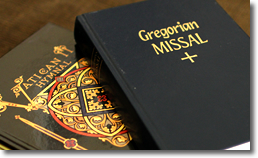It might be helpful to first explain what the Roman Gradual is, as priests are sometimes hesitant or embarrassed to admit ignorance regarding this book. The Roman Gradual is a collection of prayers (chants) carefully assigned to each Mass. Each Proper is usually about one or two sentences long and almost always an excerpt from Sacred Scripture. These prayers (chants) have been developed and perfected by the Western Church for more than 1,500 years. Believe it or not, musical notation itself was invented for the sole purpose of notating these chants. Furthermore, thanks to technological advances, we can view the earliest manuscripts of the Roman Gradual without leaving the comfort of our home. Here are but a few examples that will leave lovers of Gregorian chant utterly bewildered with delight: Einsiedeln 121 (AD 960-970); Laon 239 (10th century); St Gall 359 (AD 922-925); and St Gall 339 (AD 1000).
The Roman Gradual was revised in 1974 for the post-Conciliar liturgy, and this "1974 Graduale Romanum" is recommended for musicians who sing at Ordinary Form Masses, even though the chants are basically the same as the 1908 Graduale. Because the 1974 Roman Gradual is written in Latin, many Americans prefer the "Gregorian Missal," which is identical to the 1974 book except it is written in English and lacks the daily Masses. Many vendors sell this "must have" book, and it is also available for free download.
 The prayers (chants) found in the Roman Gradual are called by many names: Graduale Propers, Sung Propers, Mass Propers, etc. Having been refined by the Church over so many centuries, the Propers contain deep theology and perfectly suite each Mass, whether it is Christmas Day, Holy Thursday, Pentecost, Epiphany, etc. The Consilium (the group of bishops and experts set up by Pope Paul VI to implement the Constitution on the Liturgy) wrote in 1969 that those who do not sing the Propers "cheat the people."
The prayers (chants) found in the Roman Gradual are called by many names: Graduale Propers, Sung Propers, Mass Propers, etc. Having been refined by the Church over so many centuries, the Propers contain deep theology and perfectly suite each Mass, whether it is Christmas Day, Holy Thursday, Pentecost, Epiphany, etc. The Consilium (the group of bishops and experts set up by Pope Paul VI to implement the Constitution on the Liturgy) wrote in 1969 that those who do not sing the Propers "cheat the people."Read the rest here.
No comments:
Post a Comment